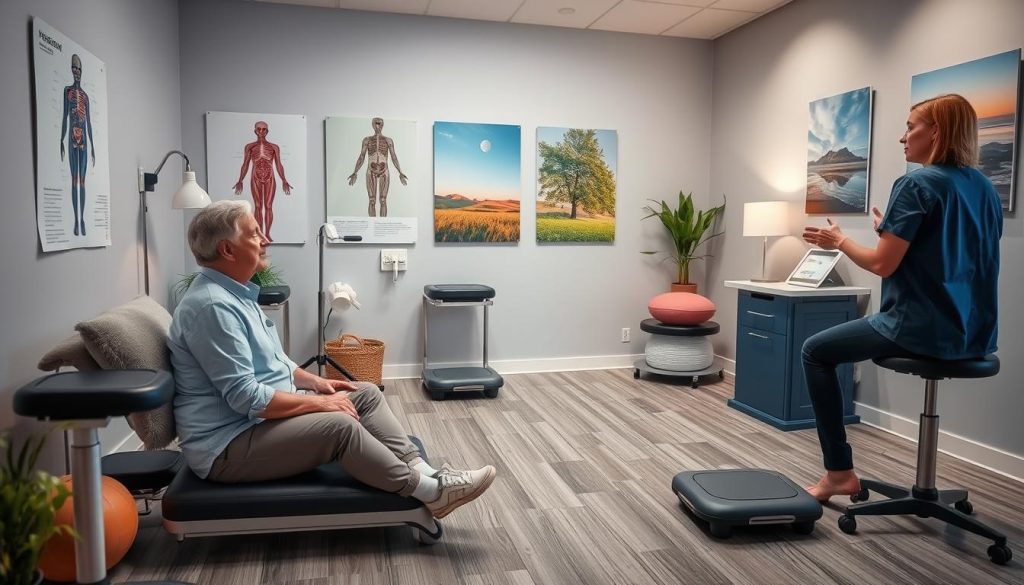Dealing with vertigo can be tough, but there are ways to find relief. This guide will show you how to manage vertigo symptoms. We’ll cover quick tips and long-term treatments to help you feel better.
Vertigo makes people feel like they’re spinning, even when they’re not. It affects millions globally. Knowing how to handle vertigo is key to a better life. We’ll explore exercises, lifestyle changes, and medical options to help you manage vertigo.
Understanding Vertigo: Causes and Types
Vertigo is a complex condition with many causes. Knowing these causes helps find the right treatment. Let’s look at the main types of vertigo and what causes them.
BPPV (Benign Paroxysmal Positional Vertigo)
BPPV is the most common vertigo type. It happens when tiny calcium crystals in your inner ear move. This causes brief but intense dizzy spells, often from head movements.
Vestibular Neuritis and Labyrinthitis
These conditions involve inflammation of the inner ear or vestibular nerve. They can cause severe vertigo lasting days or weeks. Viral infections often cause these disorders.
Meniere’s Disease and Other Common Causes
Meniere’s disease causes recurring vertigo, hearing loss, and tinnitus. Other causes include migraines, head injuries, and certain medications.
| Type of Vertigo | Main Cause | Duration of Symptoms |
|---|---|---|
| BPPV | Displaced ear crystals | Seconds to minutes |
| Vestibular Neuritis | Inner ear inflammation | Days to weeks |
| Meniere’s Disease | Fluid buildup in inner ear | 20 minutes to several hours |
Knowing these types helps you understand how to manage vertigo symptoms. Each type may need a different approach, from simple head maneuvers to medication or lifestyle changes.
Immediate Steps: How to Help Vertigo When an Episode Strikes
Vertigo can be very disorienting and unsettling. When it happens, acting fast is crucial. Here are some tips to help you feel better and regain your balance.
First, find a safe spot to sit or lie down. This can prevent falls and injuries. Keep your head still and look at a fixed point to help your brain adjust. Slow, deep breaths can also calm your body and mind, easing vertigo symptoms.
Try these ways to reduce vertigo:
- Close your eyes to block out confusing visual signals
- Slowly turn your head from side to side
- Gently massage the back of your neck and head
- Sip cool water to stay hydrated
Dimming lights and reducing noise can also help. These changes can lessen sensory overload and ease symptoms. For some, applying a cold compress to the forehead or neck provides relief.
Remember, vertigo episodes usually pass within minutes. If symptoms last longer or get worse, seek medical help. With practice, these tips can be your go-to strategy for managing sudden attacks.
The Epley Maneuver: A Proven Technique for Vertigo Relief
The Epley maneuver is a key exercise for vertigo relief. It targets BPPV, a common vertigo cause. Let’s look at how to do it and its benefits.
Step-by-Step Guide to Performing the Epley Maneuver
Here’s how to do the Epley maneuver:
- Sit on a bed, turning your head 45 degrees to the affected side
- Quickly lie back with your head on the bed, keeping the 45-degree angle
- Hold this for 30 seconds
- Turn your head 90 degrees to the opposite side
- Roll onto your side, keeping your head in position
- Slowly return to a sitting position
When to Use and Expected Results
Use the Epley maneuver for BPPV symptoms. Many see big improvements after a few tries. It’s a top vertigo exercise for quick relief.
Safety Precautions and Considerations
Be careful with the Epley maneuver:
- Do it with a doctor’s help first
- Move slowly to avoid bad dizziness
- Stop if you feel really sick or throw up
- See a doctor if symptoms don’t get better or get worse
The Epley maneuver is just one vertigo exercise. Mixing it with others can make it even better for managing symptoms.
Essential Vestibular Exercises for Managing Symptoms
Vertigo exercises are key to managing symptoms and improving balance. They help your brain adjust to changes in the inner ear. This reduces dizziness and boosts stability. Check out some effective vestibular exercises for vertigo relief.
Gaze stabilization exercises are crucial for vertigo relief. Look at a target while moving your head. Start slow and get faster as you get better. This helps your brain handle head movements without getting dizzy.
Balance training is also essential. Try standing on one foot or walking heel-to-toe. These exercises improve balance and strengthen your core, lowering fall risk.
Habituation exercises help you get used to movements that cause dizziness. Start with small movements and gradually increase them. This helps your brain adapt and reduces vertigo symptoms over time.
“Consistency is key when performing vertigo exercises. Regular practice leads to significant improvements in balance and reduced dizziness.”
Start slow and progress gradually. If you feel severe dizziness or nausea, stop and see your doctor. With patience and effort, these exercises can greatly improve your life and manage vertigo symptoms.
Natural Remedies and Lifestyle Changes for Vertigo Control
Vertigo can be tough, but there are ways to manage it. Making simple changes to your diet, stress levels, and sleep can help. You might find relief from vertigo episodes.
Dietary Modifications that Help
Some foods can make vertigo worse. Try to eat less of:
- Caffeine and alcohol
- High-sodium foods
- Processed sugars
Eat more fruits, veggies, and whole grains. Drinking more water and avoiding foods that trigger migraines can also help.
Stress Management Techniques
Stress can make vertigo symptoms worse. Here are some ways to reduce stress:
- Deep breathing exercises
- Meditation or mindfulness practices
- Gentle yoga or tai chi
- Regular exercise routines
These can calm your nervous system. They might also reduce how often you get vertigo.
Sleep Position Adjustments
Your sleep position can affect vertigo. Try these changes:
- Sleep with your head slightly elevated
- Use extra pillows for support
- Avoid sleeping on your affected side if you have BPPV
Find the best position for you. Consistent sleep habits can also help manage vertigo.
“I found that changing my diet and managing stress made a significant difference in my vertigo episodes. It’s worth trying these natural approaches alongside medical treatment.”
Medical Treatment Options and Professional Care
When you have vertigo, you might need to see a doctor. They can give you treatments that fit your needs. These could be medicines, therapy, or sometimes surgery.
Medicines are key in treating vertigo. They can help with feeling dizzy or sick to your stomach. For Meniere’s disease, doctors might give you diuretics to help with fluid in your ear.

Vestibular rehabilitation therapy is a special kind of physical therapy. It helps your brain get better at balancing. This therapy can really help people with vertigo.
In some cases, surgery might be needed. This is usually for very bad or lasting vertigo that doesn’t get better with other treatments. Doctors might do things like fix the position of tiny stones in your ear or do surgery for Meniere’s disease.
| Treatment Type | Purpose | Effectiveness |
|---|---|---|
| Medications | Reduce dizziness and nausea | High for symptom relief |
| Vestibular Rehabilitation | Retrain balance processing | High for long-term improvement |
| Surgery | Correct underlying issues | Varies, last resort option |
What’s the best treatment for vertigo depends on why you have it. Always talk to a doctor to find the right treatment for you.
Preventing Vertigo Episodes: Key Strategies
Stopping vertigo before it starts is possible with the right approach. By making smart changes to your surroundings and habits, you can find ways to reduce vertigo and keep your world steady.
Environmental Modifications
Your home can be a safe haven from vertigo triggers. Remove throw rugs to prevent trips. Install nightlights to guide you in the dark. Keep walkways clear and use non-slip mats in the shower. These simple changes can help vertigo at home.
Trigger Avoidance
Know your triggers to stop vertigo in its tracks. Common culprits include:
- Sudden head movements
- Certain foods or drinks
- Stress and lack of sleep
- Specific visual stimuli
Keep a diary to spot patterns. Once you know your triggers, you can plan to avoid them. This strategy is key in how to help vertigo stay away.
Regular Exercise Routines
Exercise isn’t just good for your body; it’s great for balance too. Gentle activities like tai chi or yoga can boost your balance and cut down on vertigo spells. Start slow and build up over time. Regular movement can be one of the most effective ways to reduce vertigo long-term.
Remember, prevention is better than cure. By taking these steps, you’re not just learning how to help vertigo – you’re taking control of your health. For more health tips, check out this guide on managing allergic rhinitis, which shares similar principles of proactive health management.
Alternative Therapies and Complementary Treatments
Looking into natural remedies for vertigo can help find more relief. Many people see good results by trying alternative therapies along with traditional ones. These methods aim to tackle vertigo symptoms and boost overall health.
Acupuncture is a favorite among those with vertigo. This ancient Chinese method involves putting thin needles into certain spots on the body. Some say it helps reduce dizziness and improves balance. Even though studies show mixed results, many find it worth trying.
Herbal remedies are also used to help with vertigo. Ginger, known for fighting nausea, might ease symptoms. Ginkgo biloba, thought to enhance blood flow to the brain, is another choice. But, always talk to a doctor before starting any herbal treatment, as it can interact with medicines.
Biofeedback is another unique way to manage vertigo. It teaches patients to control their body’s functions. By learning to control heart rate and muscle tension, some manage vertigo better. Regular practice can lead to better symptom control over time.
It’s important to see these alternative therapies as part of a bigger treatment plan. Mixing them with standard care might give the best results for dealing with vertigo symptoms.
Emergency Signs: When to Seek Immediate Medical Attention
Managing vertigo symptoms at home is common. But, some signs need urgent medical help. Knowing these red flags is key to staying safe during severe vertigo episodes.
Red Flag Symptoms
Watch out for these warning signs that mean you need to see a doctor right away:
- Sudden, severe headache
- Loss of consciousness
- Difficulty speaking or slurred speech
- Vision changes or double vision
- Weakness on one side of the body
- Vertigo accompanied by high fever
- Persistent vomiting

Emergency Response Protocol
If you see any red flag symptoms, here’s what to do:
- Call emergency services immediately
- Stay in a safe position to prevent falls
- If possible, have someone stay with you
- Provide a list of your medications to responders
- Describe your symptoms clearly to medical professionals
Acting quickly can greatly improve your vertigo treatment. Don’t wait if you’re unsure about your symptoms.
| Symptom | Possible Cause | Action Required |
|---|---|---|
| Sudden severe vertigo with hearing loss | Labyrinthitis | Seek immediate medical care |
| Vertigo with neck pain after injury | Cervical vertigo | Emergency room visit |
| Vertigo with chest pain or shortness of breath | Cardiovascular issues | Call 911 immediately |
Living with Chronic Vertigo: Long-term Management Tips
Living with chronic vertigo can be tough, but you can still have a good life. To manage vertigo, you need to use both medical treatments and lifestyle changes.
- Making your home safer by removing tripping hazards
- Using walking sticks to help with balance
- Taking breaks during the day
- Learning to relax and handle stress
Work and social life might also need changes. Talk to your boss about flexible work hours or remote work. For social events, pick quieter places and tell your friends about your vertigo.
Creating a detailed management plan is vital. This plan should include:
| Component | Description |
|---|---|
| Medication schedule | Keep track of when to take your meds |
| Exercise routine | Do exercises that help with balance |
| Trigger diary | Write down things that make symptoms worse |
| Emergency protocol | What to do when vertigo gets really bad |
Being consistent is crucial in managing vertigo. Stick to your treatment plan and ask for help when you need it. Healthcare professionals and support groups can be great resources.
Support Systems and Resources for Vertigo Sufferers
Living with vertigo can be tough, but you’re not alone. There are many support systems and resources to help you. Support groups let you share your story and learn from others. You can find them locally or online, offering tips and emotional support.
Online communities are also key for vertigo sufferers. Sites like Facebook groups and health forums connect you with others. You can ask questions and share tips, keeping up with the latest in vertigo management.
Professional groups like the Vestibular Disorders Association (VeDA) have lots of helpful info. Their websites have detailed guides on vertigo causes and treatments. They also host webinars and workshops, offering expert advice to improve your life.
Don’t overlook local healthcare providers. Specialists in vestibular rehabilitation and ENT can give you personalized advice. They’ll help you with exercises and treatments, making it easier to manage your vertigo. Remember, asking for help is a big step towards better health.
FAQ
Q: What are the most common causes of vertigo?
A: Vertigo can be caused by several things. BPPV (Benign Paroxysmal Positional Vertigo) is one, due to calcium crystals in the inner ear. Viral infections can lead to vestibular neuritis and labyrinthitis. Meniere’s disease is caused by fluid buildup in the inner ear.
Q: How can I get immediate relief during a vertigo episode?
A: To get relief, sit or lie down right away. Look at a fixed object and breathe deeply. Avoid sudden head movements. Closing your eyes and staying still can also help. Keeping antihistamines or anti-nausea medication nearby is a good idea.
Q: What is the Epley maneuver and how does it help with vertigo?
A: The Epley maneuver is a set of head and body movements. It treats BPPV by moving calcium crystals in the inner ear. It often helps people with BPPV vertigo, giving relief in one or two treatments.
Q: Are there any effective exercises for managing vertigo symptoms?
A: Yes, there are exercises that can help. Gaze stabilization, balance training, and habituation exercises are good. The Brandt-Daroff exercise and the Semont maneuver are also effective. Always do these exercises with a healthcare professional’s guidance.
Q: Can dietary changes help reduce vertigo episodes?
A: Yes, changing your diet can help. For Meniere’s disease, reduce salt, limit caffeine and alcohol, and drink plenty of water. Avoiding foods high in tyramine or MSG can also help.
Q: When should I seek emergency medical attention for vertigo?
A: Get medical help right away if you have severe headache, chest pain, or trouble breathing. Also, seek help if you have numbness, slurred speech, or vision changes. These could be signs of a serious issue like a stroke. If your vertigo is sudden and severe, or if you have hearing loss, get emergency care.
Q: Are there any natural remedies that can help with vertigo?
A: Yes, natural remedies can help. Ginger can help with nausea, ginkgo biloba improves blood flow, and vitamin D may reduce vertigo. Essential oils like peppermint and lavender can also offer relief. Always talk to a healthcare provider before trying new remedies.
Q: How can I prevent future vertigo episodes?
A: To prevent vertigo, stay hydrated, reduce stress, and get enough sleep. Avoid sudden head movements and do balance exercises regularly. Knowing and avoiding your triggers can also help.


















